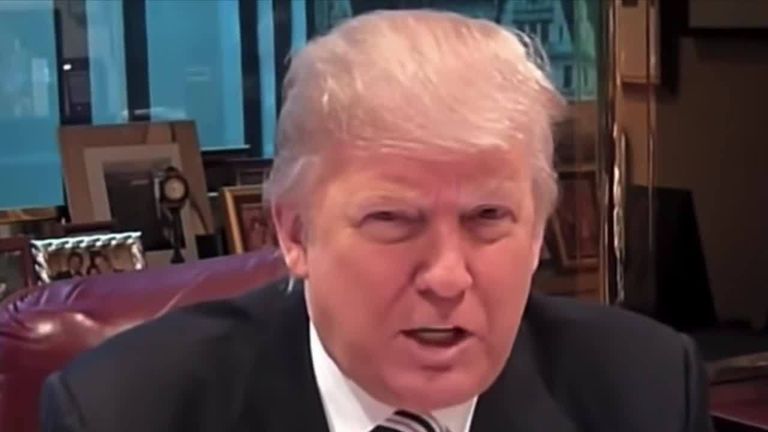Iran's Qassem Soleimani has been a threat to the US for decades - so why kill him now?
Critics will want to see evidence that the upcoming US election and impeachment proceedings played no part in the decision making.
Friday 3 January 2020 20:46, UK
It had been a quiet week in Washington.
US President Donald Trump was at his Florida home, and almost all politicians are scattered across the country or on vacation.
In the absence of news, the rolling TV channels were forced to recycle old arguments about the impending impeachment trial of the president, and the fundraising figures of candidates running for election in November.
And then came the Pentagon's statement announcing President Trump had authorised the killing of Qassem Soleimani.
Predictably the reaction to it was split along party lines. While Republicans praised their president's decisive leadership, Democrats fretted about the timing and the possible consequences.
House Speaker Nancy Pelosi complained that Congress had not been consulted.
She said: "We cannot put the lives of American service members, diplomats and others further at risk by engaging in provocative and disproportionate actions.
"Tonight's airstrike risks provoking further dangerous escalation of violence.
"America - and the world - cannot afford to have tensions escalate to the point of no return."
Former vice president Joe Biden who could be debating Mr Trump on national security matters if he wins the Democratic Party presidential nomination, said: "President Trump just tossed a stick of dynamite into a tinderbox, and he owes the American people an explanation of the strategy and plan to keep safe our troops and embassy personnel, our people and our interests, both here at home and abroad, and our partners throughout the region and beyond."
But Mr Biden acknowledged he hadn't seen the intelligence on which the military strike was based.
The most senior House Republican Kevin McCarthy praised the killing of Soleimani as a "statement to those seeking to attack America".
And Senator Lindsey Graham, claimed that he had discussed the plan in advance while visiting Mr Trump earlier in the week at his Mar-a-Lago resort.
It's the kind of strong, pro-military action which always plays well with Mr Trump's base and occasionally with independents.
But this is not like the killing of Osama bin Laden, or even the more recent targeting of Islamic State leader Abu Bakr al Baghdadi.
While the US is claiming the Iranian general was responsible for the deaths of hundreds of Americans fighting in Iraq, and Mr Trump tweeted a suggestion that he was directly or indirectly behind "millions of deaths", frankly, hardly any Americans had ever heard of Soleimani until after his death.
Unlike the death of al Baghdadi, Mr Trump did not gloat about the details of the mission to kill him, or take questions from the media.
Politically that might be wise, because the consequences of his action are still unknown.
:: Listen to the Daily podcast on , , ,
New York Mayor Bill de Blasio was quick to hold a news conference expressing fears there could be security repercussions for his city, and saying "we have to be ready".
If what happened at Baghdad Airport does lead to a violent response from Tehran and the loss of American lives, that will become a major focus of his re-election campaign. This is a president who promised Americans that he would put a stop to "endless wars" in the Middle East.
A video has been widely circulated on social media of the then private citizen Trump talking in 2011. In it, and several subsequent tweets, he attacked president Barack Obama's Iranian policy.
"Our president will start a war with Iran because he has absolutely no ability to negotiate - he's weak and ineffective," Mr Trump had said. "So the only way he figures that he's going to get re-elected, and as sure as you're sitting there, is to start a war with Iran."
Many have speculated on the timing of the missile strike.
While Secretary of State Mike Pompeo insisted it was an intelligence-led decision to save lives, Soleimani has been a threat to the US for decades.
Critics will want to see evidence that election calculations and a distraction from impeachment proceedings played no part in the decision-making process.










